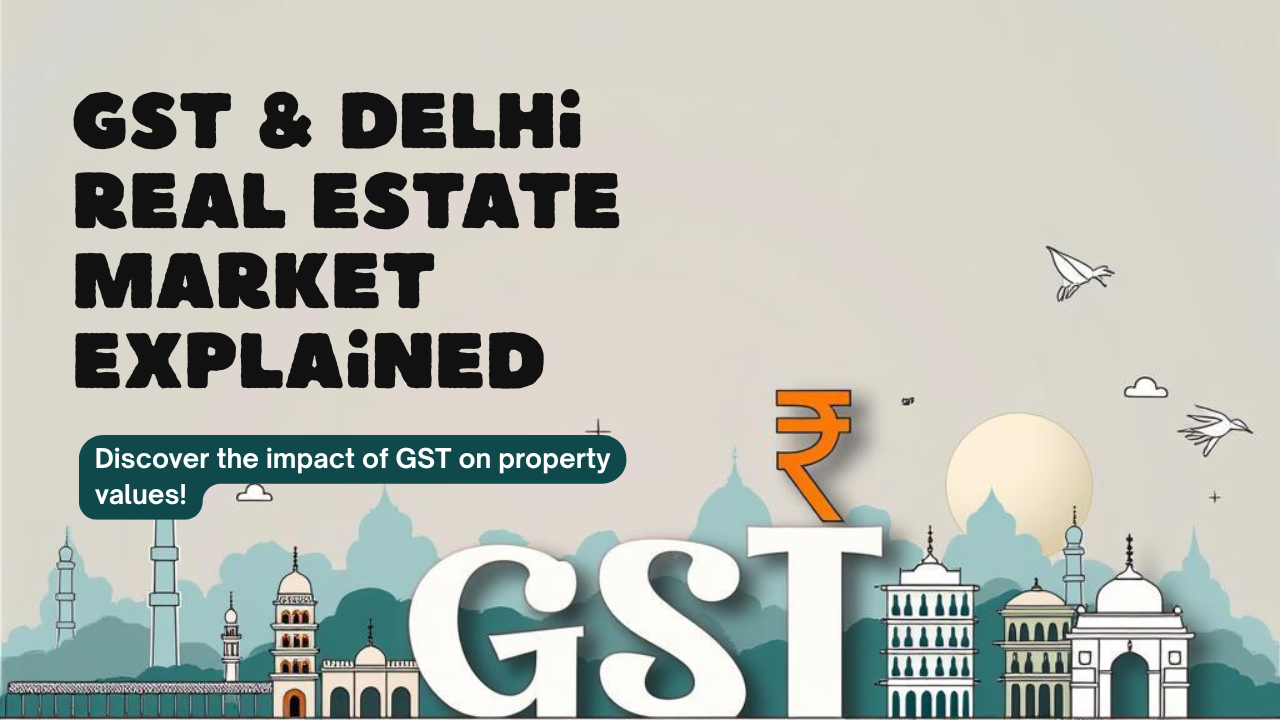The introduction of the Goods and Services Tax (GST) in 2017 marked a significant shift in India’s taxation system, aiming to unify various indirect taxes under a single umbrella. The real estate sector, a substantial contributor to the nation’s GDP, has experienced notable transformations due to GST. As we navigate through 2025, it’s essential to understand the impact of GST on Delhi Real Estate, affecting developers, homebuyers, and the market dynamics at large.
GST Framework in Real Estate: A Recap
Before delving into its impact, let’s revisit the GST structure concerning real estate:
- Under-Construction Properties: These attract GST, with rates revised in 2019 to 5% for non-affordable housing and 1% for affordable housing, both without the benefit of Input Tax Credit (ITC).
Source : Juris Hour - Completed or Ready-to-Move-In Properties: Such properties are exempt from GST, provided they have obtained the necessary completion certificates.
Source : Juris Hour - Land Transactions: The sale of land or plots remains outside the purview of GST.
Source : Juris Hour
Impact on Homebuyers in Delhi
- Cost Implications:
- Affordable Housing: The reduced GST rate of 1% without ITC has made affordable housing more accessible, encouraging first-time homebuyers to invest.
Source : Juris Hour - Non-Affordable Housing: A GST rate of 5% without ITC applies to non-affordable housing, potentially increasing the overall cost for buyers.
Source : Juris Hour
- Affordable Housing: The reduced GST rate of 1% without ITC has made affordable housing more accessible, encouraging first-time homebuyers to invest.
- Preference for Ready-to-Move-In Properties:
Given that completed properties are exempt from GST, there’s been a noticeable shift in buyer preference towards ready-to-move-in homes to avoid additional tax burdens.
Source : Juris Hour
Impact on Developers
- Input Tax Credit (ITC) Restrictions:
The removal of ITC for residential projects has led to increased construction costs, as developers can no longer offset taxes paid on inputs like cement and steel. This escalation in costs often translates to higher property prices for consumers.
Source : Juris Hour - Compliance and Transparency:
GST has streamlined taxation, reducing the complexities associated with multiple indirect taxes. This simplification has enhanced transparency in transactions, fostering trust among buyers and investors.
Source : Juris Hour
Delhi’s Real Estate Market Trends in 2025
- Stabilization Post-GST Implementation:
Initially, GST’s introduction led to a slowdown in the real estate market due to transitional challenges. However, by 2025, the market has adjusted, with both developers and buyers acclimating to the new tax regime.
Source : https://dwello.in - Affordable Housing Surge:
The favorable GST rate for affordable housing has spurred growth in this segment. Delhi has witnessed an uptick in affordable housing projects, aligning with the government’s ‘Housing for All’ initiative.
Source : Juris Hour - Luxury and Premium Housing:
While the GST rate remains at 5% without ITC for luxury housing, developers are advocating for the reintroduction of ITC to manage escalating costs. The absence of ITC has led to increased prices in the luxury segment, affecting demand.
Source : Juris Hour
Challenges and Considerations
- Increased Tax Burden:
The GST rate on under-construction properties is 12%, compared to the previous service tax rate of 4.5%, significantly increasing the tax burden on developers.
Source : MYGSTRefund - No Input Tax Credits:
Real estate developers cannot claim credit for taxes paid during construction, leading to a higher effective tax rate.
Source : MYGSTRefund - Increased Costs:
The higher tax burden has resulted in a rise in costs for under-construction properties by 7–10%, making purchases more expensive for homebuyers.
Source : MYGSTRefund
Future Outlook
As we progress through 2025, stakeholders in Delhi’s real estate market are advocating for certain reforms:
- Reintroduction of ITC:
Developers are urging the government to consider reinstating ITC for residential projects to alleviate construction costs and stabilize property prices.
Source : Juris Hour - GST Rate Revisions:
There’s a growing demand for revisiting GST rates, especially for under-construction properties, to boost market sentiment and encourage investments.
Source : Juris Hour - Policy Reforms:
Continuous dialogue between industry stakeholders and policymakers is essential to address challenges and harness opportunities presented by the evolving GST framework.
Source : Juris Hour
Conclusion
The implementation of GST has undeniably transformed Delhi’s real estate market, introducing both challenges and opportunities. While it has streamlined taxation and enhanced transparency, concerns like increased costs due to the absence of ITC persist. A collaborative approach involving policymakers, developers, and buyers is crucial to navigate these challenges and ensure sustainable growth in Delhi’s real estate sector in the years to come.

